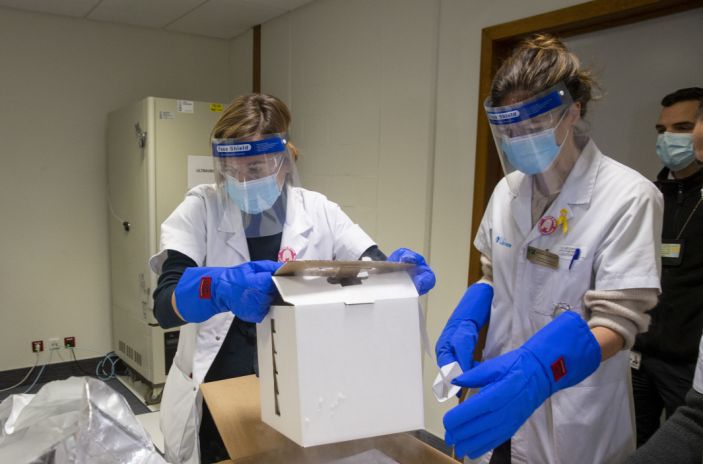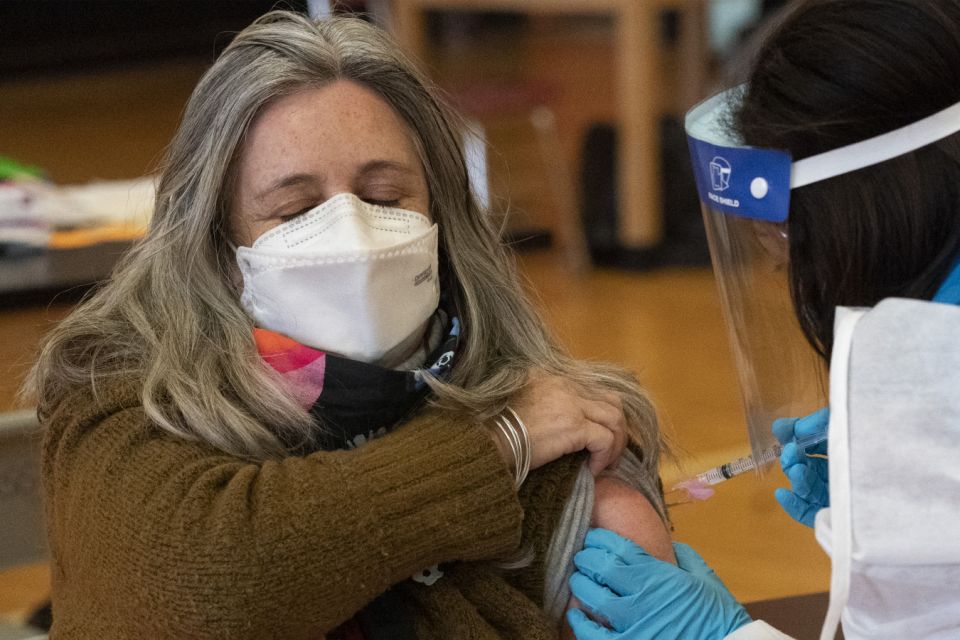EU begins vaccine rollout as new virus strain spreads
 Medical staff receive part of a Pfizer-BioNTech Covid-19 vaccine shipment at the UZ Leuven hospital in Leuven, Belgium, Saturday, Dec. 26, 2020. Belgium is preparing to begin its Covid-19 vaccination program, with first vaccinations beginning on Monday. (Nicolas Maeterlinck, Pool via AP)
Medical staff receive part of a Pfizer-BioNTech Covid-19 vaccine shipment at the UZ Leuven hospital in Leuven, Belgium, Saturday, Dec. 26, 2020. Belgium is preparing to begin its Covid-19 vaccination program, with first vaccinations beginning on Monday. (Nicolas Maeterlinck, Pool via AP)The European Union began a vaccine rollout Saturday, even as countries in the bloc were forced back into lockdown by a new strain of the virus, believed to be more infectious, that continues to spread from Britain.
The pandemic has claimed more than 1.7 million lives and is still running rampant in much of the world, but the recent launching of innoculation campaigns has boosted hopes that 2021 could bring a respite.
The first shipments of coronavirus vaccines have arrived across the European Union as authorities prepared to administer the first shots to the most vulnerable people in a coordinated effort on Sunday. The vaccines developed by BioNTech and Pfizer arrived by truck in warehouses across the continent on Friday and early Saturday after being sent from a manufacturing center in Belgium before Christmas.
The rollout marks a moment of hope for a region that includes some of the world’s earliest and worst-hit virus hot spots, including Italy and Spain, and others, like the Czech Republic, that were spared the worst early on only to see their health care systems near their breaking points in the fall. Altogether, the 27 EU member states have seen at least 16 million cases of the coronavirus and more than 336,000 deaths.
Hours before the first vaccine doses arrived in France, Paris’ health ministry confirmed late Friday that it had detected its first case of the new variant in a citizen returned from Britain.
Several countries have reported cases of the new strain, which has sent jitters through already overstretched health services.
There was little sign of the usual Boxing Day sale rush on the streets of Sydney Saturday, as residents largely heeded the state premier’s request they stay home faced with a new virus cluster.
“Even when we entered the store there were less than ten people,” shopper Lia Gunawan told The Sydney Morning Herald after queueing up for the sales.
Even as some European nations eye a post-Christmas return to harsh restrictions, China’s communist leadership issued a statement hailing the “extremely extraordinary glory” of its handling of the virus that emerged in the country’s Hubei province last year, state news agency Xinhua reported.
Across the world, people are being urged to respect social distancing guidelines, as the World Health Organisation urged people not to “squander” the “great, heart-wrenching sacrifices” people had made to save lives.
– New variant –
The first French case of the new coronavirus variant was found in a citizen resident in Britain who arrived from London on December 19, the French health ministry said.
They are asymptomatic and self-isolating at home in Tours in central France, and contact-tracing has taken place for the health professionals who treated him.
The new strain of the virus, which experts fear is more contagious, prompted more than 50 countries to impose travel restrictions on the UK, where it first emerged.
But cases of the new variant have still been reported worldwide: on Friday, Japan confirmed five infections in passengers from the UK, while cases have also been reported in Denmark, Lebanon, Germany, Australia and the Netherlands.
South Africa has detected a similar mutation in some infected people, but on Friday denied British claims its strain was more infectious or dangerous than the one originating in the UK.
The closure of the UK-France border for 48 hours led to a bottleneck of up to 10,000 lorries in southeast England, with drivers stranded for days over the festive period.
But the head of the Calais port operator told AFP that after the port remained open over Christmas specially, the “situation should be completely taken care of” soon.
– New restrictions –
Some countries that loosened restrictions slightly for Christmas have re-imposed them — Austria, for example, will see a curfew imposed from Saturday until 24 January.
Millions in the United Kingdom have been affected by a tightening of restrictions there — according to the BBC, more than 40% of England’s population are now affected by the strictest measures — which include the closure of all non-essential businesses and a limiting of social contacts.
New lockdowns also started in Scotland and Northern Ireland on Saturday, and Wales has re-imposed restrictions too after relaxing them for Christmas.
More than 25 million infections have been recorded in Europe, according to an AFP tally on Friday.
– Vaccine hope –
Vaccinations in all 27 European Union countries will begin on Sunday, after regulators approved the Pfizer-BioNTech vaccine on 21 December.
As vaccine rollout gets underway across the world, WHO chief Tedros Adhanom Ghebreyesus warned on Friday:
“Vaccines are offering the world a way out of this tragedy. But it will take time for the whole world to be vaccinated.”
The pope’s Christmas message also referenced the issue, with a plea for “vaccines for all”.
“I call on everyone, on leaders of states, on businesses, on international organisations, to promote cooperation and not competition, to find a solution for everyone… especially the most vulnerable and most in need in all regions of the planet,” Pope Francis said.
SOURCE: AFP










